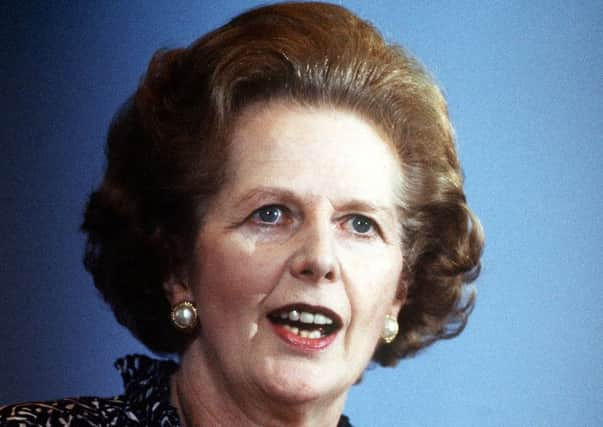Paris Gourtsoyannis: A 20-year wait for scrutiny is too long


A political milestone was passed in the lull between Christmas and New Year, when most of the country had its feet up in front of the TV and was too comfortable to notice.
Margaret Thatcher appeared on front pages and at the top of news bulletins for perhaps the last time, thanks to the annual release of Cabinet Office papers from the National Archives in London. This year’s documents were from 1989 and 1990, and included the shock from the Kremlin at her resignation, where political assassination had been considered only a domestic sport.
Advertisement
Hide AdAdvertisement
Hide AdExamining the product of decommissioned Whitehall typewriters for Mrs Thatcher’s royal blue scrawl is fascinating for journalists, and the titillation of indiscreet Cabinet briefings about foreign heads of government makes for good copy. The declassified documents are also a lesson in the machinery of Downing Street – who can get time with the prime minister at short notice, and why.
But the skeletons that come tumbling out after 20-odd years have inevitably picked up a layer of dust by the time the cupboard door is yanked open. The passage of time means revelations are more likely to be met with a shrug than any real shock.
Perhaps they deserve better. In a democracy, you can be disappointed but not surprised that politicians shirk unpopular decisions – it’s the price sometimes paid for having elections.
But in any normal circumstances, ministers expressing a willingness to impose huge economic cost on an entire nation to protect votes in a single constituency would be damaging, to say the least.
That was what senior members of Mrs Thatcher’s Cabinet were considering in 1989, when they were forced by the courts to look again at rules requiring all intercontinental flights to Scotland to stop at Prestwick Airport.
In spite of loud complaints from the tourist industry and Scottish business as a whole, transport secretary Paul Channon and Scottish secretary Malcolm Rifkind were recorded as having told the prime minister the monopoly should be kept in place, at least in part out of concern at George Younger’s 182-vote majority in Ayr.
Thankfully, the Tories’ natural inclination to liberalise markets eventually won. But would the electoral politics of a single constituency have been considered if the ministers involved knew their discussions would be made public, long before their retirement from government and politics?
Even when the decisions are much harder, the argument for secrecy isn’t much better. The declassified papers reveal that on the day the Iranian journalist Farzad Bazoft, arrested in Iraq on bogus espionage charges while working for the Observer, was hanged by Saddam Hussein’s regime, chief secretary to the Treasury Norman Lamont argued that retaliatory sanctions would inflict “disproportionate damage on UK industry”.
Advertisement
Hide AdAdvertisement
Hide Ad“We have a considerable commercial presence to protect,” foreign secretary Douglas Hurd wrote in reply. It is an ugly irony that within months, British planes would be bombing Saddam’s forces.
Confronted with questions about their decisions many years ago, Mrs Thatcher’s surviving ministers can be forgiven for their patchy memory. Some of the key players are no longer around to answer questions at all – Lord Dervaird, the former Court of Session judge who resigned amid talk at the highest level of government about a “homosexual scandal”, died last year.
Demands for an apology over the matter come too late. Documents now suggest he was asked to resign by Mr Rifkind and the former head of the judiciary Lord Hope, even though nothing resembling what we would now call a scandal materialised.
In 2009, a review of the rules restricting access to public records concluded that rapid changes in the way society both consumes information and relates to government meant the 30-year restriction on the release of public records was no longer appropriate.
It was nonsensical in the wake of the Freedom of Information Act, which has reinforced the presumption towards open government, that a well-crafted request could get hold of private discussions put on paper in the here-and-now, while other documents remain hidden for decades. As a result of that review, by 2022 records will be released within 20 years – but that sound logic surely means that the current rules cannot survive much longer.
Governments aren’t held to the promises of their predecessors, so why should discussions by ministers be kept secret after they leave office, whether in an election, change of government or Cabinet reshuffle?
There are very good reasons for keeping some things back, and many government papers are. Certain Cold War files will be under wraps until the middle of this century.
But protecting national security shouldn’t be used as an argument to protect careers. Leaders should be able to be as honest in public as they are in private, especially now.
Advertisement
Hide AdAdvertisement
Hide AdToday’s politics is fuelled by the expectation of certainty in the face of complex problems. The reams of paper churned out by government agonising over every policy detail stand in defiance of that expectation – there are no easy answers, and when ministers try to reach one glibly, it shows.
Government needs to be able to hold discussions in private, but its members shouldn’t be able to rely on a 20-year vow of silence to avoid scrutiny of how those decisions are being made.
We live in cynical times, when a lack of trust in government and the media nourishes conspiracy theories and a belief in the easy answers offered by strongmen.
Exposing the reality of decision-making would provide ammunition for the fight against myth, and focus criticism onto those who deserve it – as well as helping to keep decision-makers honest, in public and in private.
